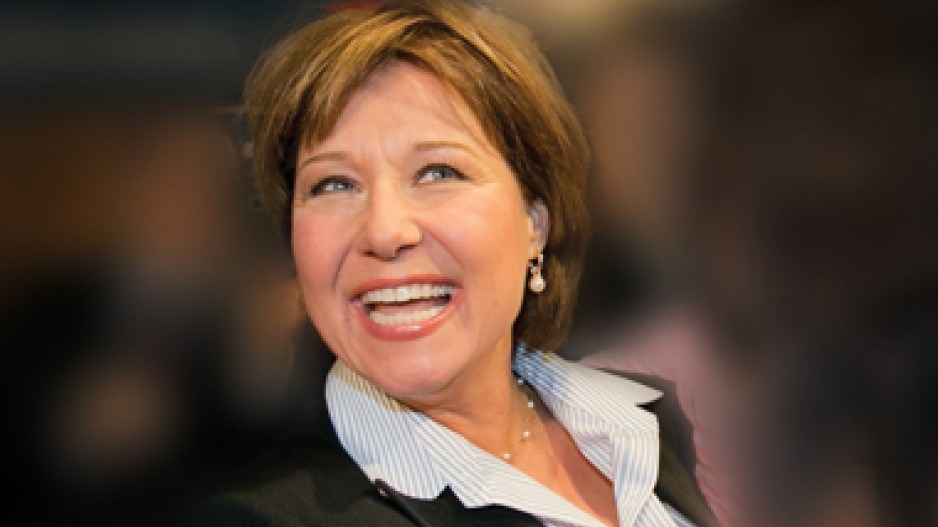Seven months after their surprise election win and six months after being sworn in as premier, Christy Clark and the BC Liberals are still riding high on their bread-and-butter economic issues of job creation and energy development, a new poll conducted by Insights West for Business in Vancouver reveals.
Exclusive poll results: see below.
But the party has lost support from even steadfast BC Liberal voters on cuts to BC Ferries, BC Hydro rate hikes and the decision to cancel the fall sitting of the legislature.
However, the Liberals have seen little political fallout from those unpopular decisions. Currently holding a majority of seats against an effectively leaderless B.C. NDP, the Liberals could count on the support of 40% of divided voters if an election were held tomorrow.
That compares with 36% of decided voters who would choose the NDP and 14% who would vote Green.
"For the Liberals, it shows that there's a lot of staying power," Mario Canseco, vice-president of public affairs for Insights West, told Business in Vancouver.
"People may not be happy with some of the decisions that were made, particularly on the hydro and ferries files, and less than 20% say it was a good idea to shut down the legislature, but it's not enough to make people who voted Liberal be uneasy about it or start to reject their choice."
Canseco added that while the Liberals have made some unpopular decisions, the public backlash doesn't come anywhere near the "immediate and long-lasting" public animosity generated by the Liberals when the party introduced the HST. The backlash over the unpopular tax ultimately prompted the departure of Gordon Campbell.
Voters have also rated Clark poorly on her handling of housing, homelessness and poverty. Poll respondents rated poverty as the second most important issue, tied with health. Voters chose the economy as the most important issue.
"It's the first time I've seen housing, homelessness, and poverty this high," Canseco said. "It's usually less than 10% and health care is usually the most important issue."
A recent report from First Call BC Child and Youth Advocacy Coalition showing B.C. with the highest child poverty rate among all Canadian provinces likely contributed to voters' focus on the issue. In addition, the province has had either Canada's worst or second worst child poverty rate for the past 10 years.
Canseco also noted that some voters who are not happy with either the Liberals or the NDP seem to be "parking" their vote with the Green Party. That party is performing better now than it did during the May election, when voters elected B.C.'s first Green MLA, Andrew Weaver, in Victoria's Oak Bay-Gordon Head riding.
Winning more seats will be key to developing support for the Green Party, Canseco said, as will raising the profile of Adam Olsen, the Green's new – and largely unknown – leader.
The past six months have not been kind to the approval rating of either the Liberal or NDP leaders. Nine per cent of poll respondents said their view of Clark had improved over the past six months; 35% said their view of her had worsened. For the NDP, 4% said their opinion of outgoing leader Adrian Dix had improved; 27% said it had worsened.
Clark's approval rating currently stands at 42%, while 46% disapprove of her performance. Dix's approval rating is 34%, with 52% disapproving. The BC Liberals have stronger support from men (48% to 32%); the NDP leads among women voters (33% to 40%).
Insights West surveyed 866 British Columbians between November 26 and December 3, 2013. The poll has a margin of error of plus or minus 3.3 percentage points, 19 times out of 20. •
An exclusive survey by Business in Vancouver and Insights West on how Christy Clark and her Liberal government are doing six months into their mandate and seven months after their surprise reelection
The most important issue facing British Columbians: The economy
1. Leading a trade mission to Asia:
Good job: 46%
Bad job: 27%
2. Pushing LNG:
Good job: 42%
Bad job: 35%
3. Dealing with Northern Gateway:
Good job: 37%
Bad job: 50%
4. Shutting down Pacific Carbon Trust:
Good job: 29%
Bad job: 37%
5. Managing BC Hydro:
Good job: 17%
Bad job: 68%
6. Cancelling fall sitting:
Good job: 13%
Bad job: 62%
7. Managing BC Ferries:
Good job: 12%
Bad job: 75%
At least a third of respondents think Clark and her government are doing a good job handling crime, the economy, energy, the environment and education. They are not doing so well on health care, business taxes or skilled workers. Fewer than 25% approve of the government's handling of government accountability and housing/poverty.
1. Crime/public safety:
Good job: 43%
Bad job: 34%
2. Economy/jobs:
Good job: 39%
Bad job: 46%
3. Energy/pipelines/LNG:
Good job: 39%
Bad job: 47%
4. The environment:
Good job: 34%
Bad job: 50%
5. Education:
Good job: 33%
Bad job: 50%
6. Health care:
Good job: 29%
Bad job: 56%
7. Business taxes/red tape:
Good job: 29%
Bad job: 42%
8. Shortage of skilled workers:
Good job: 28%
Bad job: 47%
9. Government accountability:
Good job: 23%
Bad job: 63%
10. Housing/poverty/homelessness:
Good job: 21%
Bad job: 61%
The economy/jobs 26%
Housing/poverty/homelessness 17%
Health care 17%
Government accountability 13%
Energy/pipelines/LNG 12%
Environment 6%
Education 3%
Crime/public safety 3%
Shortage of skilled workers 2%
Business taxes/red tape 1%
Christy Clark :
Approve: 42%
Disapprove: 46%
Adrian Dix:
Approve: 34%
Disapprove: 51%
Adam Olsen:
Approve: 7%
Disapprove: 20%
Christy Clark:
Improved: 9%
Stayed the same: 48%
Worsened: 35%
Adrian Dix:
Improved: 4%
Stayed the same: 58%
Worsened: 27%
BC Liberals: 40%
NDP: 36%
Green Party: 14%
Conservatives: 6%
Other: 3%




